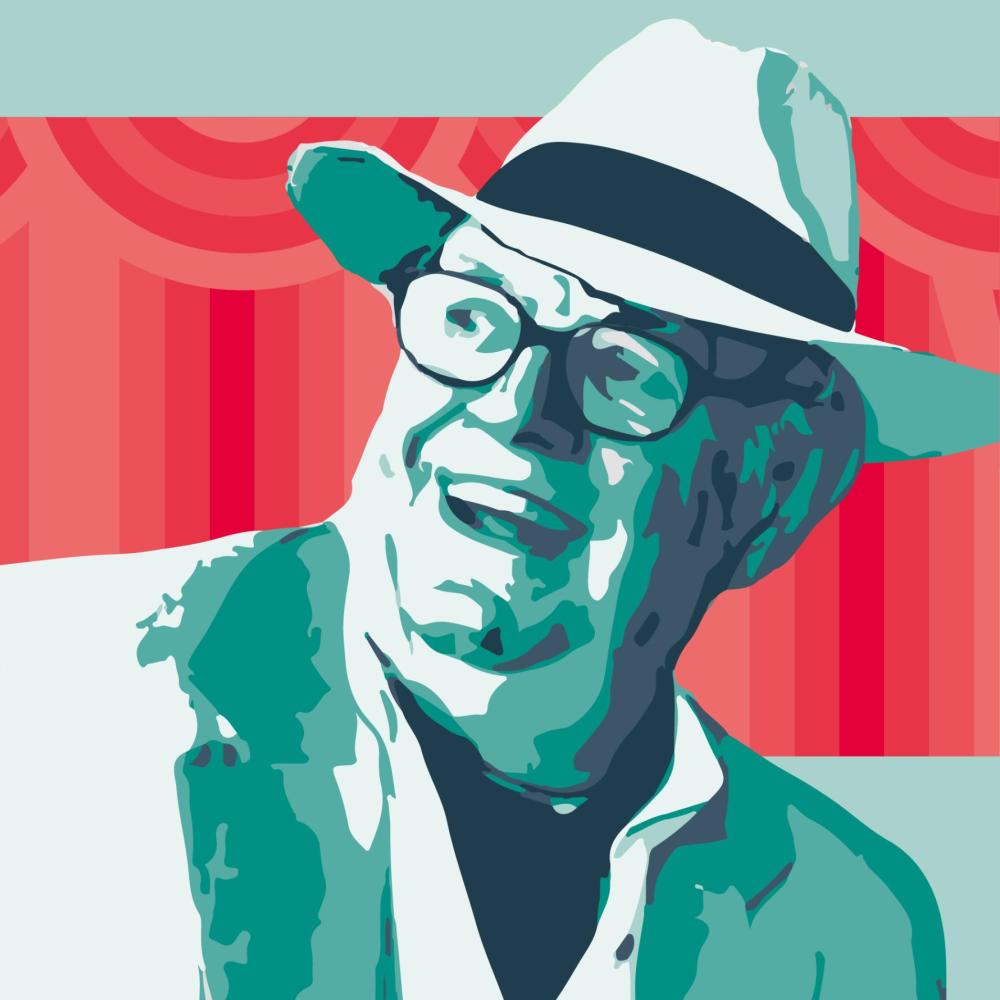

Dario FO (°1926 - 2016)
Profession: Playwright, director, actor
Nationality: Italian
Why an honorary doctorate?
In 2001, playwright Dario Fo received an honorary doctorate from VUB.
The game of acting
Throughout his career, Dario Fo has staged controversial and progressive subjects, giving sound and image to thoughts that were prevalent but therefore went unspoken.
His independent vision and socially-motivated spirit are a fascination for VUB.
They support the Brussels university ethos and still invite us to avoid blinkeredness and pigeonholing today.
Life is not endless. Time flies, like a wrinkled cliché with much recognition but little acclaim. Things are what they are. Then things are in your own hands.
Dario Fo placed his passion in public view. Because he addressed limitations, and inhibitions in general. Of time, of possibilities, of creative extravagance. But passion needs no brake. Seize opportunities, so that they continue to exist posthumously. To touch, to move, and to say: ‘Stop, I stand still, I think, and I go my own way.’
Not everyday.
Dario Fo: Europe's most talented political clown. A rebel, a cabaret artist, a minstrel.
Nobel Prize in Literature 1997
The first Nobel Prize winner in his class who only wrote plays.
"Know how to live the time that is given you."
About his career
Fo's story: Please tell me
24 March 1926. In Sangiano, a small town on the shores of Lake Maggiore in the province of Varese, Dario Fo is born. His father plays in an amateur theatre company, his mother writes a book (in the 1970s) published by the prestigious publishing house 'Einaudi'. The apple does not fall far from the tree. Dario's grandfather has a farm, where little Fo spends his holidays. To sell his agricultural products, Grandpa Fo intrigues his customers with the most fascinating anecdotes. It is there that Dario learns storytelling.
The Fo family often moves because it is necessary for father's (railway) profession. But wherever the Fo family goes, the cultural setting remains. Dario grows up in an atmosphere of stories. In local inns, he listens breathlessly to the tales of glassblowers and fishermen who do not shy away from sharp political satire.
It is 1940 and Dario goes to study in Milan. He ends up in the Army towards the end of WWII, escapes there and hides in an attic for the last months of the war before returning to university. His attention turns to theatre set design and he starts improvising monologues.
In the post-war years, the Italian theatre undergoes a major revolution. The new phenomenon of 'piccoli teatri' (small theatres) is emerging. Dario is completely captivated by this vibrant trend and becomes an avid theatre-goer. He makes new friends there and entertains them with the stories he heard during his childhood.
It is summer in 1950. Dario meets actor and director Franco Parenti, who enthusiastically invites him to join his theatre company. Dario performs in his variety shows and in that period he sees - in photos - Franca Rame for the first time. He immediately loses his head and knows: she will be my wife. The real-life encounter is not long in coming. During the preparations for Spiller and Carosso's 'Sette giorni a Milano', on which they are both working, they collide as if by accident. Not much later, they are engaged.
They marry, and they set up the theatre group Nuova Scena. The couple perform their pieces in working-class environments: factory warehouses, workers' houses and women's residences. Their thousand-strong audience is at the bottom of the social ladder. Dario Fo stands up for them, wants them to understand reality better through theatre. He draws on the 'commedia dell'arte', improvisational theatre that not only makes jokes but also does away with the ruling class.
Fo invents monologues, does satirical performances, is confronted with censorship, cooperates in various film script projects. A seemingly endless list of creations. After the terrorist attack on the Banca Nazionale dell'Agricoltura in Milan in '69, Dario Fo writes and produces one of his most famous plays 'Morte accidentale di un anarchico' or 'Accidental Death of an Anarchist'.
Dario Fo also gains fame in the Netherlands, at the opera, with Rossini's 'Il barbiere di Siviglia'. In Belgium, many well-known actors, including Jan Decleir, interpret his roles. The monologue 'The first miracle of the infant Jesus' is one of his most famous performances. Fo is actively involved in the birth of the Flemish theatre group 'Internationale Nieuwe Scène'. The company produces Fo's famous play 'Mistero Buffo'.
Fo does not rest on his political laurels either. He aspires to the position of mayor of Milan, competes in the primaries in 2006, but loses.
13 October 2016. On the day that singer Bob Dylan is awarded the Nobel Prize for Literature, Dario Fo exchanges earthly for heavenly existence in a hospital in Milan. The end, or fine, as it was also indicated in his plays.
Accidental Death of an Anarchist
After the terrorist bank attack in Milan in '69, Dario Fo writes and produces one of his most famous plays ‘Morte Accidentale di un Anarchico'.
Nuova Scena
Fo bases himself on the 'commedia dell'arte'.
Mistero Buffo
He is actively involved in the birth of the Flemish theatre group 'international new scene'.
What is an honorary doctorate?
VUB has awarded honorary doctorates every year since 1978 to personalities from the most diverse backgrounds who have made a remarkable contribution to their field and to society. From this solemn moment of recognition, they bear the honorary title of Doctor Honoris Causa of VUB.